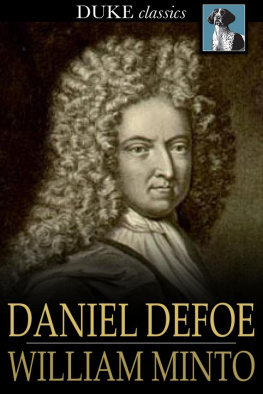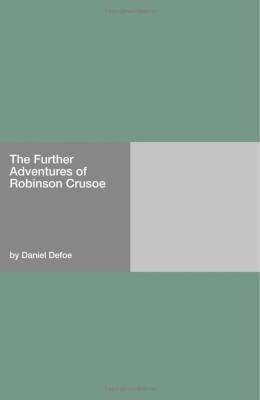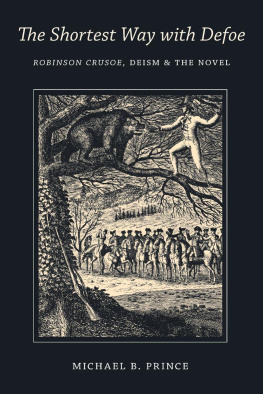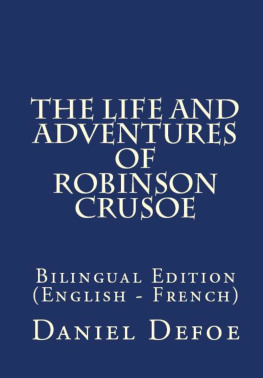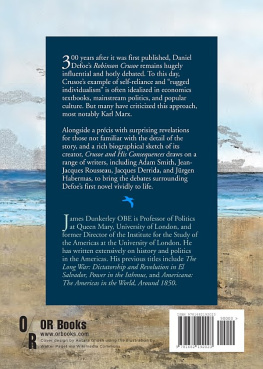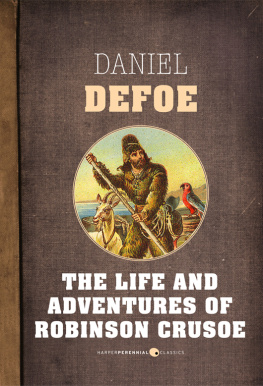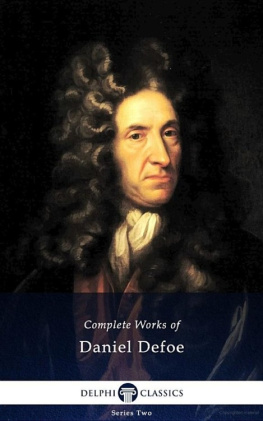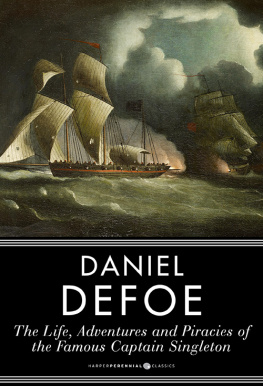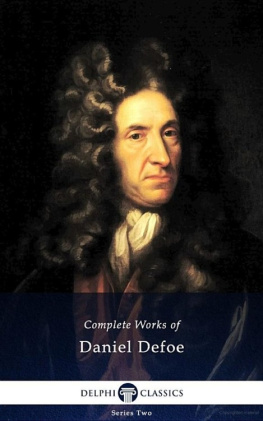William Minto - Daniel Defoe
Here you can read online William Minto - Daniel Defoe full text of the book (entire story) in english for free. Download pdf and epub, get meaning, cover and reviews about this ebook. year: 2012, publisher: Duke Classics, genre: Detective and thriller. Description of the work, (preface) as well as reviews are available. Best literature library LitArk.com created for fans of good reading and offers a wide selection of genres:
Romance novel
Science fiction
Adventure
Detective
Science
History
Home and family
Prose
Art
Politics
Computer
Non-fiction
Religion
Business
Children
Humor
Choose a favorite category and find really read worthwhile books. Enjoy immersion in the world of imagination, feel the emotions of the characters or learn something new for yourself, make an fascinating discovery.
- Book:Daniel Defoe
- Author:
- Publisher:Duke Classics
- Genre:
- Year:2012
- Rating:3 / 5
- Favourites:Add to favourites
- Your mark:
- 60
- 1
- 2
- 3
- 4
- 5
Daniel Defoe: summary, description and annotation
We offer to read an annotation, description, summary or preface (depends on what the author of the book "Daniel Defoe" wrote himself). If you haven't found the necessary information about the book — write in the comments, we will try to find it.
Learn more about the life and works of the brilliant eighteenth-century spy, novelist, and rabble-rouser Daniel Defoe in this penetrating biography penned by William Minto. Minto, a Scottish professor of logic, offers a keenly insightful take on the influences and events that shaped Defoes contributions to journalism and literature, which included such works as Robinson Crusoe and Moll Flanders.
Daniel Defoe — read online for free the complete book (whole text) full work
Below is the text of the book, divided by pages. System saving the place of the last page read, allows you to conveniently read the book "Daniel Defoe" online for free, without having to search again every time where you left off. Put a bookmark, and you can go to the page where you finished reading at any time.
Font size:
Interval:
Bookmark:

From a 1901 edition
ISBN 978-1-62012-493-2
Duke Classics
2012 Duke Classics and its licensors. All rights reserved.
While every effort has been used to ensure the accuracy and reliability of the information contained in this edition, Duke Classics does not assume liability or responsibility for any errors or omissions in this book. Duke Classics does not accept responsibility for loss suffered as a result of reliance upon the accuracy or currency of information contained in this book.
There are three considerable biographies of Defoethe first, by GeorgeChalmers, published in 1786; the second by Walter Wilson, published in1830; the third, by William Lee, published in 1869. All three arethorough and painstaking works, justified by independent research anddiscovery. The labour of research in the case of an author supposed tohave written some two hundred and fifty separate books and pamphlets,very few of them under his own name, is naturally enormous; and when itis done, the results are open to endless dispute. Probably two men couldnot be found who would read through the vast mass of contemporaryanonymous and pseudonymous print, and agree upon a complete list ofDefoe's writings. Fortunately, however, for those who wish to get aclear idea of his life and character, the identification is not pureguess-work on internal evidence. He put his own name or initials to someof his productions, and treated the authorship of others as opensecrets. Enough is ascertained as his to provide us with the means for acomplete understanding of his opinions and his conduct. It is Defoe'smisfortune that his biographers on the large scale have occupiedthemselves too much with subordinate details, and have been misled froma true appreciation of his main lines of thought and action byreligious, political, and hero-worshipping bias. For the followingsketch, taking Mr. Lee's elaborate work as my chronological guide, Ihave read such of Defoe's undoubted writings as are accessible in theLibrary of the British Museumthere is no complete collection, Ibelieve, in existenceand endeavoured to connect them and him with thehistory of the time.
W.M.
The life of a man of letters is not as a rule eventful. It may be richin spiritual experiences, but it seldom is rich in active adventure. Weask his biographer to tell us what were his habits of composition, howhe talked, how he bore himself in the discharge of his duties to hisfamily, his neighbors, and himself; what were his beliefs on the greatquestions that concern humanity. We desire to know what he said andwrote, not what he did beyond the study and the domestic or the socialcircle. The chief external facts in his career are the dates of thepublication of his successive books.
Daniel Defoe is an exception to this rule. He was a man of action aswell as a man of letters. The writing of the books which have given himimmortality was little more than an accident in his career, acomparatively trifling and casual item in the total expenditure of hismany-sided energy. He was nearly sixty when he wrote Robinson Crusoe.Before that event he had been a rebel, a merchant, a manufacturer, awriter of popular satires in verse, a bankrupt; had acted as secretaryto a public commission, been employed in secret services by fivesuccessive Administrations, written innumerable pamphlets, and editedmore than one newspaper. He had led, in fact, as adventurous a life asany of his own heroes, and had met quickly succeeding difficulties withequally ready and fertile ingenuity.
For many of the incidents in Defoe's life we are indebted to himself. Hehad all the vaingloriousness of exuberant vitality, and was animated inthe recital of his own adventures. Scattered throughout his variousworks are the materials for a tolerably complete autobiography. This isin one respect an advantage for any one who attempts to give an accountof his life. But it has a counterbalancing disadvantage in thecircumstance that there is grave reason to doubt his veracity, Defoe wasa great story-teller in more senses than one. We can hardly believe aword that he says about himself without independent confirmation.
Defoe was born in London, in 1661. It is a characteristic circumstancethat his name is not his own, except in the sense that it was assumed byhimself. The name of his father, who was a butcher in the parish of St.Giles, Cripplegate, was Foe. His grandfather was a Northamptonshireyeoman. In his True Born Englishman, Defoe spoke very contemptuouslyof families that professed to have come over with "the Norman bastard,"defying them to prove whether their ancestors were drummers or colonels;but apparently he was not above the vanity of making the world believethat he himself was of Norman-French origin. Yet such was the restlessenergy of the man that he could not leave even his adopted name alone;he seems to have been about forty when he first changed his signature"D. Foe" into the surname of "Defoe;" but his patient biographer, Mr.Lee, has found several later instances of his subscribing himself "D.Foe," "D.F.," and "De Foe" in alternation with the "Daniel De Foe," or"Daniel Defoe," which has become his accepted name in literature.
In middle age, when Defoe was taunted with his want of learning, heretorted that if he was a blockhead it was not the fault of his father,who had "spared nothing in his education that might qualify him to matchthe accurate Dr. Browne, or the learned Observator." His father was aNonconformist, a member of the congregation of Dr. Annesley, and the sonwas originally intended for the Dissenting ministry. "It was hisdisaster," he said afterwards, "first to be set apart for, and then tobe set apart from, that sacred employ." He was placed at an academy forthe training of ministers at the age, it is supposed, of about fourteen,and probably remained there for the full course of five years. He hashimself explained why, when his training was completed, he did notproceed to the office of the pulpit, but changed his views and resolvedto engage in business as a hose-merchant. The sum of the explanation isthat the ministry seemed to him at that time to be neither honourable,agreeable, nor profitable. It was degraded, he thought, by the entranceof men who had neither physical nor intellectual qualification for it,who had received out of a denominational fund only such an education asmade them pedants rather than Christian gentlemen of high learning, andwho had consequently to submit to shameful and degrading practices intheir efforts to obtain congregations and subsistence. Besides, thebehaviour of congregations to their ministers, who were dependent, wasoften objectionable and un-Christian. And finally, far-flown birdshaving fine feathers, the prizes of the ministry in London weregenerally given to strangers, "eminent ministers called from all partsof England," some even from Scotland, finding acceptance in themetropolis before having received any formal ordination.
Though the education of his "fund-bred" companions, as he calls them, atMr. Morton's Academy in Newington Green, was such as to excite Defoe'scontempt, he bears testimony to Mr. Morton's excellence as a teacher,and instances the names of several pupils who did credit to his labours.In one respect Mr. Morton's system was better than that which thenprevailed at the Universities; all dissertations were written and alldisputations held in English; and hence it resulted, Defoe says, thathis pupils, though they were "not destitute in the languages," were"made masters of the English tongue, and more of them excelled in thatparticular than of any school at that time." Whether Defoe obtained atNewington the rudiments of all the learning which he afterwards claimedto be possessed of, we do not know; but the taunt frequently levelled athim by University men of being an "illiterate fellow" and no scholar,was one that he bitterly resented, and that drew from him manyprotestations and retorts. In 1705, he angrily challenged John Tutchin"to translate with him any Latin, French, or Italian author, and afterthat to retranslate them crosswise for twenty pounds each book;" and hereplied to Swift, who had spoken of him scornfully as "an illiteratefellow, whose name I forget," that "he had been in his time pretty wellmaster of five languages, and had not lost them yet, though he wrote nobill at his door, nor set Latin quotations on the front of the
Font size:
Interval:
Bookmark:
Similar books «Daniel Defoe»
Look at similar books to Daniel Defoe. We have selected literature similar in name and meaning in the hope of providing readers with more options to find new, interesting, not yet read works.
Discussion, reviews of the book Daniel Defoe and just readers' own opinions. Leave your comments, write what you think about the work, its meaning or the main characters. Specify what exactly you liked and what you didn't like, and why you think so.

